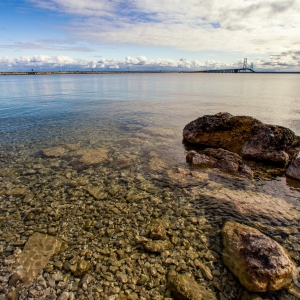The Stream, November 13, 2020: Great Lakes Water Levels Drop This Month, Still Concern Experts
GLOBAL DAILY WATER NEWS
- Water levels in Lake Michigan and Huron are still dangerously high, despite dropping this month.
- A new report calls for more funding to small-scale farmers around the world that are disproportionately affected by climate change.
- A proposal from an oil company to dump millions of gallons of oil and gas wastewater into a Wyoming aquifer was accepted.
- An environmental coalition in Oregon sues a water district over an aging dam that they say is the cause of a number of environmental concerns.
An agricultural project in the United Kingdom aims to adapt to a climate where rain and flooding will be more common.
“We’re not pretending we’re farmers, this is just a shop window, a conversation starter.” – Lorna Parker, the restoration manager for the wider Great Fen project. The Great Fen project is part of an initiative to introduce paludiculture, or wet farming, to the U.K., the Guardian reports. It uses plants that thrive in saturated soil that could suit the future climate in the U.K., when weather events are expected to be more extreme and rainfall could be excessive. The project takes place in Cambridgeshire, an area where much of the farmland lies as low as four meters (13 feet) below sea level. Paludiculture could stop soil erosion, stop carbon from escaping from the ground and boost biodiversity in the area.
IN RECENT WATER NEWS
Overlooked Army Corps Rulemaking Would Shrink Federal Stream Protections
Earlier this year, the Trump administration secured one of its signature environmental legacies when it completed a rule that reduced federal protections for wetlands as well as for streams that flow only following rainfall.
Now, the Army Corps of Engineers, with much less fanfare and in the final months of the Trump administration, is considering another rule change that would also shrink federal protection of small streams, ecologists and lawyers say. The Corps said in its proposal that it is acting in response to the president’s order to review regulations that burden energy development.
In Case You Missed It:
California Water Board Collects Data on Household Water Debt, Utility Finances—More people are behind on their water bills because of the pandemic. State regulators want to know how many and how far behind.
New Report Stresses Need For Financial Assistance To Small-Scale Farmers Amid Climate Crisis
A new report from the U.N. International Fund for Agricultural Development (IFAD) and Climate Policy Initiative think-tank found that less than two percent of climate finance goes to small-scale farmers in developing nations, despite small-scale farmers making up 95 percent of the world’s farms. These farmers are disproportionately facing the effects of climate change, including rising temperatures and frequent floods and droughts. The report includes several recommendations including channeling climate finance to small-scale agriculture at large and promoting better information on measuring progress towards climate adaptation and mitigation for small-scale farmers.
TODAY’S TOP WATER STORIES, TOLD IN NUMBERS
MILLIONS OF GALLONS OF OIL AND GAS WASTEWATER
The Wyoming Oil and Gas Conservation Commission approved an application from Aethon Energy to inject millions of gallons of oil and gas wastewater in an aquifer in central Wyoming. The Casper Star Tribune reports that a hearing for the proposal was held Tuesday and featured several hours of testimony from geologists, engineers and attorneys for Aethon, along with over 100 public comments that expressed concerns over compromising the potential for the aquifer to be used as a drinking water source in the future.
3.5 INCHES (8.89 CM)
Water levels in Lakes Michigan and Huron dropped 3.5 inches in the past month, MLive reports. Levels in all the Great Lakes dropped higher than average amounts last month. The typical decline between September and October in Lakes Michigan and Huron is 2.76 inches (7 cm). The recent drops put the lakes about 10 inches (25.4 cm) below record levels, although they could climb back to record levels in February and March of 2021.
ON THE RADAR
A coalition of environmental and fishing groups are suing the Winchester Water Control District in southern Oregon over the 130-year-old Winchester Dam, the Associated Press reports. The lawsuit, filed last Friday, details the coalition’s grievances with the dam’s aging fishing ladder, which they say blocks the passage of the federally protected Oregon Coast coho salmon and other fish species. The North Umpqua River, where the dam is located, is a key part of the coastal fishing industry, Jim McCarthy with WaterWatch of Oregon told the AP. The dam considerably reduces the number of salmon that get to the Pacific Ocean and prevents returning salmon from finding spawning grounds in the river above the dam, according to the plaintiffs. The lawsuit asks a judge to order the water district to build a new fish ladder and make major repairs to the dam.
In context: Country’s Aging Dams, a ‘Sitting Duck,’ Facing a Barrage of Hazards
Jane is a Communications Associate for Circle of Blue. She writes The Stream and has covered domestic and international water issues for Circle of Blue. She is a recent graduate of Grand Valley State University, where she studied Multimedia Journalism and Women, Gender and Sexuality Studies. During her time at Grand Valley, she was the host of the Community Service Learning Center podcast Be the Change. Currently based in Grand Rapids, Michigan, Jane enjoys listening to music, reading and spending time outdoors.






Leave a Reply
Want to join the discussion?Feel free to contribute!